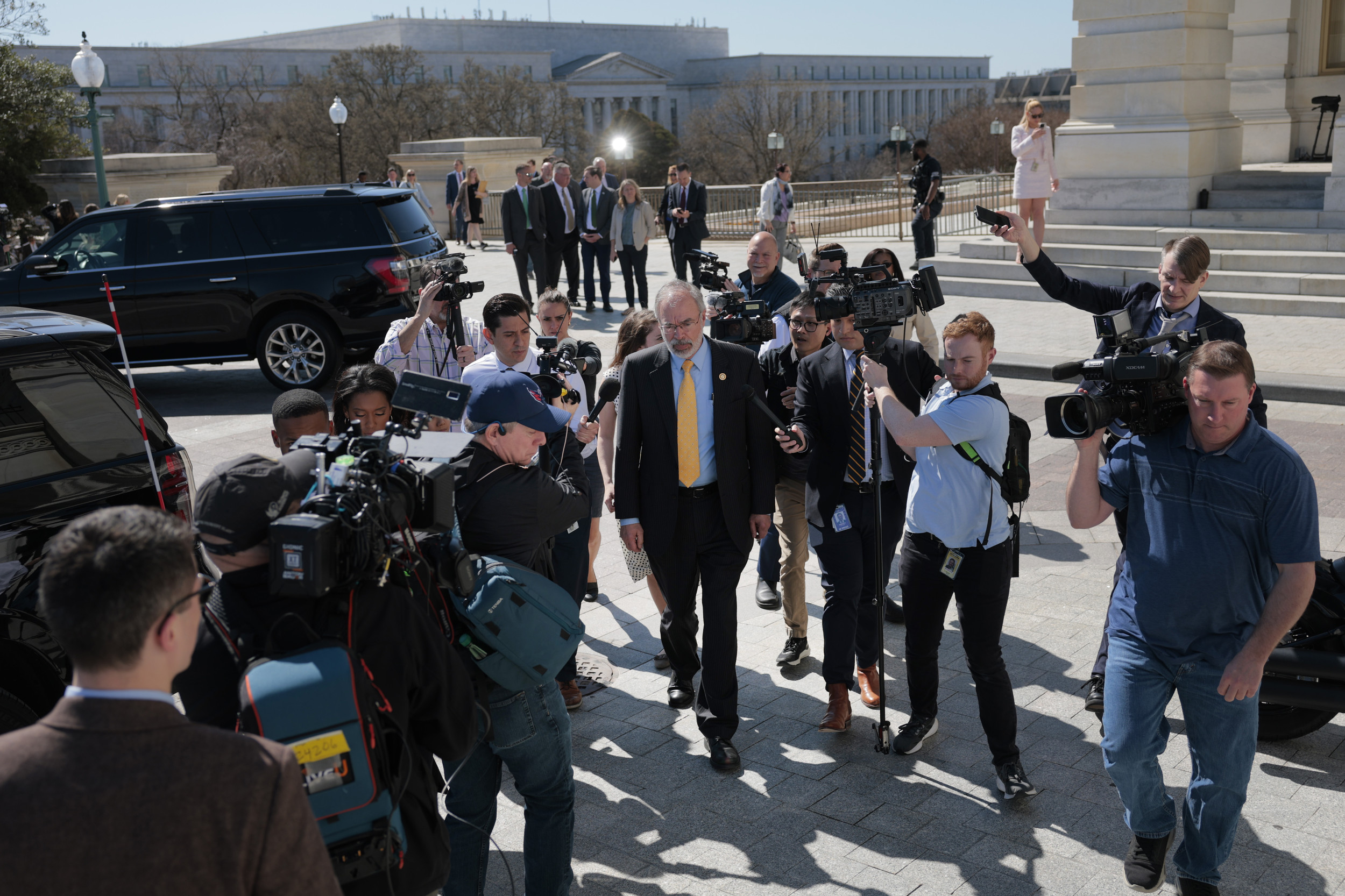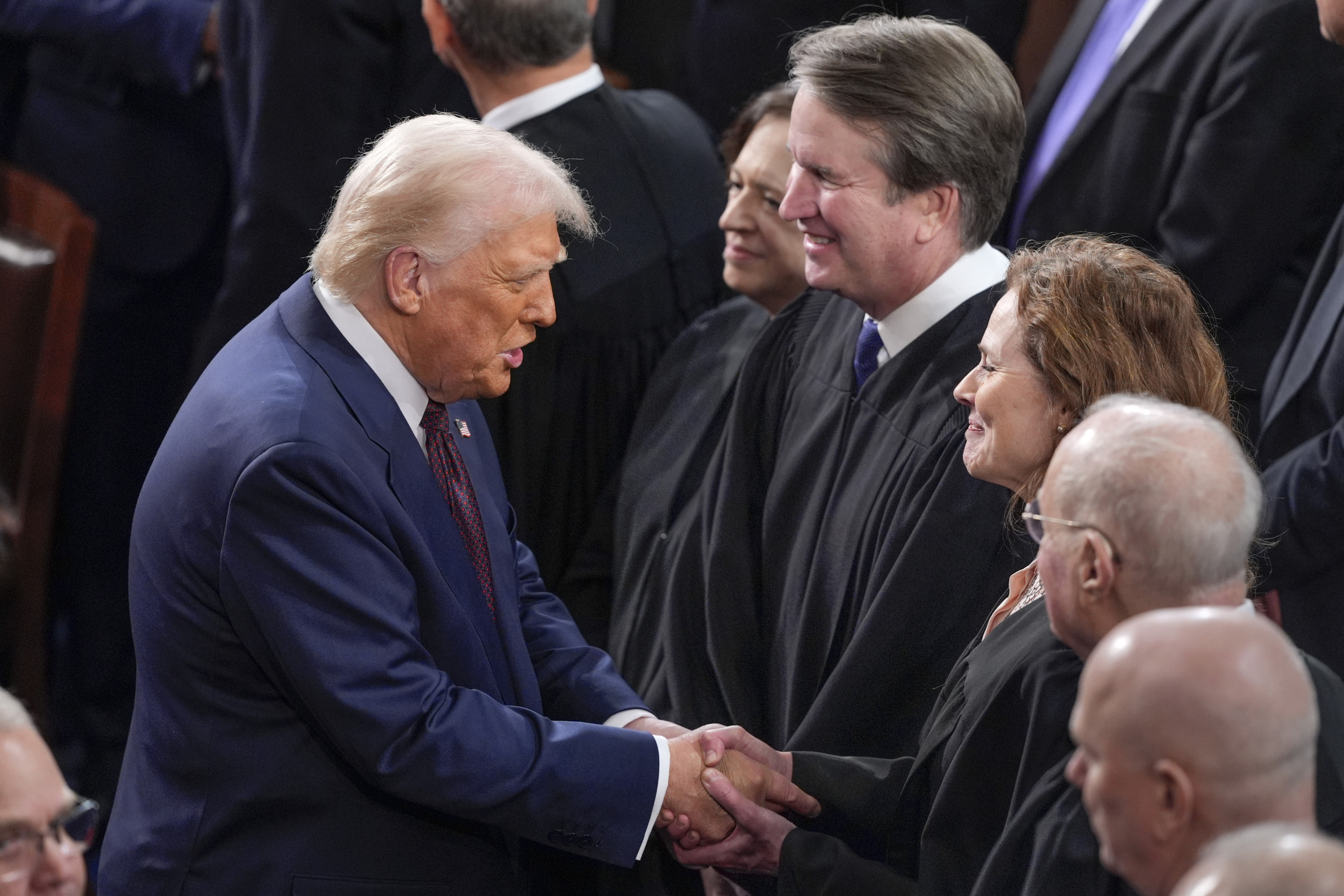President Donald Trump has slammed former FBI Director James Comey for a cryptic post made on Comey’s Instagram, saying it was a threat against him. Trump added that Comey “knew exactly what [the post] meant” in a Fox News interview clip this morning.
What to know:
- “He knew exactly what that meant. A child knows what that meant. If you’re the FBI director and you don’t know what that meant? That meant assassination. And it says it loud and clear,” Trump said.
- Comey posted a photo on Instagram of shells on a beach that were aligned to read “8647.”
- The photo immediately received backlash from people saying that the post was a “threat” against Trump.
- The former FBI director wrote in his caption, “Cool shell formation on my beach walk.”
- “8647” is perceived as an anti-Trump message, and lawmakers like Republican Senator Mike Lee are calling for Americans to condemn its use.
- “Now, he wasn’t very competent, but he was competent enough to know what that meant,” Trump said in an interview with Fox News’ Brett Baier. “And he did it for a reason, and he was hit so hard, because people like me, they like what’s happening with our country.”
Stay with Newsweek for the latest.
Trump to meet with Putin: ‘I think we’ll solve it’
Donald Trump said as he boarded Air Force One that he has plans to meet with Russian President Vladimir Putin to talk about the end of the Russia-Ukraine war.
“We have to meet,” Trump said. “He and I will meet. I think we’ll solve it, or maybe not, but at least we’ll know, and if we don’t solve it, be very interesting.”
US warns Iran ‘too close for comfort’ to nuclear weapons
U.S. Secretary of State Marco Rubio warned that Iran is “too close for comfort” to acquiring nuclear weapons, underscoring heightened concerns over Tehran’s uranium enrichment and missile capabilities.
Speaking from Turkey in an interview with Fox News host Sean Hannity, Rubio issued a stark assessment of Iran’s nuclear progress and called the regime the primary sponsor of terrorism in the Middle East.
Newsweek has reached out to the State Department and Iran’s foreign ministry for comment.
The warning comes amid escalating tensions in the Middle East and diplomatic efforts to curb Iran’s nuclear ambitions. Rubio’s comments reflect a broader U.S. strategy to deter Tehran through pressure while keeping the door open to peaceful resolution. President Donald Trump, having just visited the region, reinforced this posture with public remarks signaling that diplomacy is still possible but not guaranteed. Talks between U.S. and Iranian officials remain ongoing but face significant challenges.
House GOP tax and spending bill hits friction over Medicaid cuts and SALT relief

House Republicans are preparing to advance a sweeping tax and spending bill Friday, but internal divisions threaten to derail it. The 1,100-page “One Big Beautiful Bill Act,” named in homage to Trump, faces conservative pushback over Medicaid cuts and pressure from New York lawmakers demanding more generous state and local tax (SALT) deductions.
Freedom Caucus members want stricter work requirements for aid recipients to begin immediately, while moderates seek larger SALT relief for high-tax states. Budget Committee approval is a key step before a full House vote, expected as soon as next week.
Speaker Mike Johnson said the bill is crucial for economic stability, citing core components of tax breaks, Medicaid reforms, and defense funding. However, with only a slim majority, GOP leaders are working to avoid a committee defeat that could send them back to the drawing board.
Trump defends refugee status for White South Africans amid criticism
Trump defended his administration’s decision to grant refugee status to White South Africans arriving in the U.S., saying the country must protect people facing persecution regardless of race or background.
Speaking aboard Air Force One, Trump said, “If I see people in distress, I don’t care what color they are.” He added that, based on available evidence, “the farmers in South Africa are being treated brutally.” When asked about prioritizing White South Africans while restricting refugees from other regions, Trump insisted the decision was motivated by humanitarian concerns.
The move follows South Africa’s recent Expropriation Act, which allows the government to seize and redistribute land without compensation in some cases, aiming to address injustices from apartheid. A group of 59 White South Africans granted refugee status under this policy arrived in Washington, D.C., earlier this week, with more expected in the coming months.
Amy Coney Barrett’s Supreme Court remarks spark MAGA fury: ‘Huge mistake’

Supreme Court Justice Amy Coney Barrett’s remarks in court on Thursday have sparked MAGA backlash online, with some saying President Donald Trump made a “huge mistake” appointing her to the bench.
The nation’s highest court was hearing arguments about whether lower courts have the authority to block Trump’s executive order to end birthright citizenship, which ensures that children born in the U.S. are citizens regardless of their parents’ status.
During the hearing, Justice Coney Barrett questioned the solicitor general over the Trump administration’s approach to complying with court rulings.
Vietnam approves $1.5 billion Trump Organization project
Vietnam has approved a $1.5 billion development plan by the Trump Organization and its Vietnamese partner, Kinhbac City, to build golf courses, hotels, and residential projects in the country’s north, state-run media reported Friday, The AP reported.
The project will cover nearly 2,500 acres in Khoai Chau district and include a massive golf course, housing, commercial areas, and parks. According to VN Express, Deputy Prime Minister Tran Hong Ha signed the investment approval.
The announcement comes as Vietnam prepares for trade talks with the U.S. following the Trump administration’s move to impose steep tariffs on Vietnamese exports. The country is also under U.S. scrutiny for allegedly allowing Chinese goods to be rerouted through its borders.
Construction on the project is expected to begin this year and run through 2029.
Trump says Iran has proposal, warns of consequences if no deal
Trump seemed to acknowledge that Iran has received a U.S. proposal for a nuclear agreement, suggesting that time is running out for Tehran to act. Speaking aboard Air Force One, Trump said Iran “has a proposal,” but stressed that “they have to move quickly, or something bad’s gonna happen.”
He also claimed that negotiators are nearing a breakthrough, saying Iran had “sort of agreed” not to pursue what he called “nuclear dust.” His remarks hinted at progress but lacked details on the potential deal’s terms.
Iran has not officially responded to the comments.
India disputes Trump’s claim on tariff deal, says trade talks ongoing
India’s foreign minister said the country is still in trade talks with the Trump administration, disputing Trump’s claim that New Delhi agreed to remove all tariffs on U.S. imports. Trump has criticized India for having one of the highest tariffs in the world, saying India offered a deal to charge the U.S. no tariffs.
In Qatar, Indian Foreign Minister S. Jaishankar described the negotiations as “intricate” and ongoing. He said nothing is decided until everything is agreed upon and that any deal must work for India and the U.S., India’s largest trading partner.
“Until that is done, I think any judgment on it would be premature,” Jaishankar said.
Trump says U.S. has proposal for Iran’s nuclear program amid ongoing talks
Trump said Friday that the U.S. has presented a proposal to Iran regarding its advancing nuclear program. This marks the first time Trump publicly acknowledged that an American offer is being made to Tehran during ongoing negotiations.
The discussions have reached an expert level, focusing on detailed aspects of a potential agreement. A significant issue remains Iran’s uranium enrichment, which Tehran insists it must continue, while the Trump administration demands it stop.
Trump made the remarks aboard Air Force One at the end of his Middle East tour, which included stops in the United Arab Emirates, Saudi Arabia, and Qatar. He stressed that Iran must act quickly or face consequences without giving proposal details.
Iranian officials have not confirmed receiving the proposal. Iranian Foreign Minister Abbas Araghchi criticized inconsistent messages from the U.S. as either confusion or a negotiation tactic.
Negotiations have occurred in Oman and Rome, mediated by Oman’s foreign minister. They aim to limit Iran’s nuclear activities in exchange for easing U.S. sanctions. Tensions remain high as Trump has threatened military action if no deal is reached, while Israel has also warned of possible strikes on Iran’s nuclear sites amid ongoing regional conflicts
Clarence Thomas appears to side with Trump move to curtail judges’ powers

Supreme Court Justice Clarence Thomas has appeared to side with President Donald Trump‘s call to curtail the power of judges.
The Department of Justice has been arguing before the U.S. Supreme Court that judges on lower-level courts should only have the power to issue rulings on a specific group of people involved in a suit, and not issue nationwide injunctions.
On Thursday, Justice Thomas appeared to support that position. When discussing the history of universal injunctions with Solicitor General D. John Sauer, he asked: “So, we survived until the 1960s without universal injunctions?”
Sauer responded: “That’s exactly correct.”



